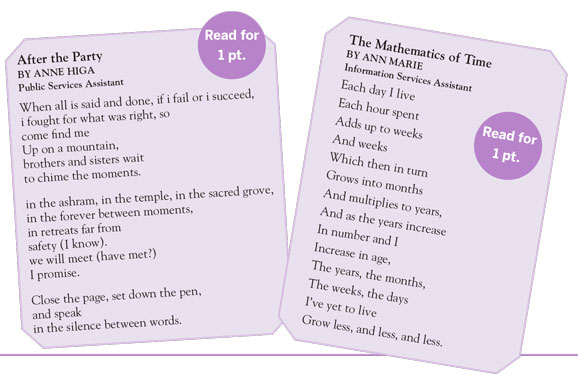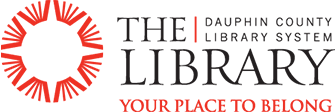“Poetry is life distilled.”
Only a poet could define an abstract so economically. In this case, Gwendolyn Brooks, poet and first African American winner of the Pulitzer Prize, reminds us why poetry deserves attention.
This April, The Library joins in celebrating all the expressions made possible by National Poetry Month with a reading challenge, Poem in Your Pocket Day, and Book Spine Poetry night.
“A lot of times, people are first introduced to poetry in school, and the poems in the curriculum can be pretty challenging,” said Adult Programming & Outreach Coordinator Ashley Famularo
“Some people worry, just like with visual art. ‘Am I understanding this right?’ ‘Do I get it?’ I think there’s this hesitation to read poetry,’’ Famularo said. “Just because you didn’t like what you were told to read in high school doesn’t mean there’s not poetry out there for you.”
National Poetry Month Reading Challenge
 The National Poetry Month Reading Challenge is for all ages and is a quick and easy way to explore poetry. Simply read 10 poems and earn 10 points to complete the challenge, or log your reading and write book reviews instead.
The National Poetry Month Reading Challenge is for all ages and is a quick and easy way to explore poetry. Simply read 10 poems and earn 10 points to complete the challenge, or log your reading and write book reviews instead.
Everyone who completes the challenge is entered to win a poetry-themed gift basket, with three each awarded for kids, teens, and adults.
- To take part in the challenge, sign up at www.dcls.org/readingchallenges or through your Beanstack account.
Where can you find poems to read? As always, The Library is full of resources, with poetry books for all reading levels in print and digital form. Read the three poems written by Library staffers and printed in the spring 2023 Compass for three points, on the spot.
Kids can meet Gwendolyn Brooks through “Gwendolyn: The Poetry and Life of Gwendolyn Brooks,” by Susan Slade and illustrated by Cozbi A. Cabrera, The Library’s 2021 guest artist for its 15th annual Joan Y. Leopold Children’s Book Week. Adults can find her and many others whose poems distill life, from W.H. Auden to Pablo Neruda, in “Poems that Make Grown Men Cry: 100 Men on the Words that Move Them.”
“This challenge is about getting outside your comfort zone and reading 10 poems to see if you can find a style of poetry that you really like,” Famularo said.
Poem in Your Pocket Day
Since it started in New York City in 2002, Poem in Your Pocket Day has expanded throughout the United States and Canada. On Thursday, April 27, The Library brings the celebration to the community for the fourth time, by distributing cards you can tuck into a pocket for reading the whole day through.
Cards will be available at all Dauphin County Library System libraries, and at seven coffee shops and cafés throughout the county – BrewBoxx Coffee, Peace of Mind Café, Millersburg; Hungry Time, Williamstown; and Yellow Bird Café, Elementary Coffee Co., Good Brotha’s Book Café (inside McCormick Riverfront Library), and The Tiger Eye, Harrisburg.
Makayla Burton, owner of The Tiger Eye, always looks forward to handing customers poems with their espressos, smoothies, and ice cream.
“It’s sweet,” she said. “This year, I want to make sure to give it to everyone who comes in, to give them an opportunity to see them and read them. Our customers are big readers. We have a Little Free Library outside, too, where customers can take and leave books. It pulls it all together.”
As Stefan Hawkins, owner of Good Brotha’s Book Café in McCormick Riverfront Library puts it: “Who doesn’t enjoy a good cup of coffee while they’re browsing for books?” Now, we can add poetry to that sentiment.
Book Spine Poetry
Maybe you’ve read a poem that goes, “Lonesome dove/Walkin’ the dog/In the woods.” Actually, you haven’t, because it’s written from the titles of books by Larry McMurtry, Walter Mosley, and Tana French.
Using the titles of books, “Book Spine Poetry” reshapes and reframes existing words or texts to create expressive poems.
- The Library brings the fun of Book Spine Poetry to Third in The Burg, 5:30 to 7:30 p.m. on Tuesday, April 21. Visit the beautifully restored and expanded McCormick Riverfront Library, where you can explore the shelves and stack book titles into your own poetic creations.
“Poetry is about little things. It’s about everyday life,’’ Famularo said. “People are learning that it doesn’t have to wax poetic about nature and philosophy. People are realizing that words contain power, and you can use poetry for multiple things.”




